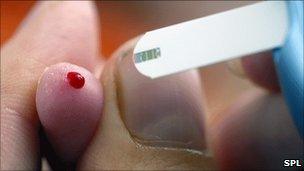NHS faces 'diabetes time bomb'
- Published

High blood sugar levels can damage the body
The health service could face a "diabetes time bomb" according to an audit of patients in England and Wales.
The report, external says 800,000 Type 1 and Type 2 patients have elevated blood sugar levels which could lead to kidney failure, limb amputation and stroke.
It warned that many of the patients were young or middle aged and could require "substantial hospital care in a matter of years".
Diabetes UK said the findings highlighted the need for urgent action.
All forms of diabetes result in raised blood sugar levels. If this is not controlled then it can cause serious damage.
The NHS Information Centre report confirmed that the number of cases of diabetes, especially Type 2, is increasing - particularly in deprived communities.
When it came to controlling blood sugar levels, around a third of more than 2 million patients had raised levels that placed them at risk of developing complications.
This was a greater problem for the under 55s.
Nearly 300,000 people were at "high risk" and 144,000 were at "dangerously high risk" in that age category.
Poor care
The report also found nearly half of patients were not getting the appropriate checks.
The National Institute for Health and Clinical Excellence recommends patients with diabetes receive nine checks annually including: blood sugar levels, whether they are smoking, and an assessment of damage to the eyes or feet due to diabetes.
The study showed that 53% of patients with Type 2 diabetes and 32% with Type 1 received all nine tests.
Audit lead clinician, Dr Bob Young, consultant diabetologist and clinical lead for the National Diabetes Information Service, said: "These results ring alarm bells.
"They show that younger people make up a quarter of all those with diabetes yet have the highest risks of potentially preventable complications.
"If these risks could be reduced, much future disability and shortened life expectancy could be prevented."
Dr Rowan Hillson, National Clinical Director for Diabetes, said: "I am very concerned that the National Diabetes Audit shows that we still have a long way to go in delivering basic standards of diabetes care for everyone.
"In particular, young and middle-aged people with diabetes are not getting the regular checks they need to manage their condition and improve outcomes.
"These checks are vital to reduce serious but avoidable complications. All health care professionals should follow NICE's clear recommendations. There is no excuse for not doing the basics well."
Barbara Young, Chief Executive at Diabetes UK, said: "This highlights the need for urgent action to ensure that people with diabetes start to receive all the basic care processes otherwise there will be more amputations, more people going blind, and more cases of kidney failure, heart disease and stroke."
- Published26 June 2011
- Published24 June 2011
- Published24 June 2011